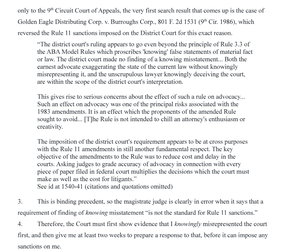Few points of interest:

If you notice, his citation is actually inapplicable, because it does not deal with "knowing lie" standard or whatever Acerthorn claims. The appellate court simply criticizes the judge for going even beyond that without making any evidentiary rulings.
So, is Acerthorn nevertheless correct? No. "Subjective bad faith is not necessary to impose sanctions under Rule 11. Sanctions under Rule 11 are appropriate when a pleading which has been filed is [...] without factual foundation....". The circumstances making apparent that the sanctioned party "must have known completely lacked a factual foundation" is sufficient. See
Orange Production Credit Association v. Frontline Ltd., 792 F.2d 797 (9th Cir.1986)
As an aside, Acerthorn concedes that his case citation is based on the wrong part on Rule 11, but other posters have already pointed that out.
This is all pointless however, because Acerthorn has actual knowledge on whether or not Paypal deducted fees from transactions he received. If he made that claim with no investigation, then it violates Fed. R. Civ. P. 11(b) "inquiry reasonable" requirement. His argument on the contratry concedes that he did no due diligence, and therefore concedes that it was in violation of Rule 11. See:


Unfortunately (for him), Court requires higher level of investigation than his (weird) example of not checking if he was scheduled for work and whining about it on Discord. As an aside, I really am unsure why he thinks that it's persuasive at all. All it shows is that he does no needed investigation even for critically important moments of his life. That just reflects badly on him whether or not him not checking his company's schedule was reasonable.


